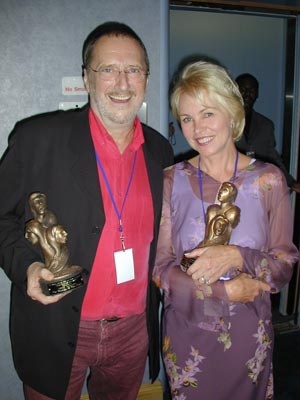The Mama's & The Papa's
(Inducted 2000)
The title of the Mamas and the Papas’ first LP If You Can Believe Your Eyes and Ears was appropriate. Looking at them, you might not believe that this combination of two mustachioed folkies, a would-be model, and a hefty jazz enthusiast could change the sound of vocal harmony in the ‘60s.
The group evolved from four previous groups started in the early ‘60s. Denny Doherty was a member of a group in New York known as the Halifax Three that included Zal Yanovsky (later to become a member of the Lovin’ Spoonful). John Phillips, active on the Greenwich Village scene, was in a folk group known as the Journeymen, one of whose members was Scott McKenzie (famous for the 1967 John Phillips-penned ode to flower power, “San Francisco (Be Sure to Wear Flowers in Your Hair).” Michelle Gilliam of Long Beach, California, came to New York in 1962 to be a model, but that career was cut short when she met Phillips and joined the Journeymen.
|
 Denny Doherty and Michelle Phillips
Denny Doherty and Michelle Phillips
of The Mama's and The Papa's
with their Harmony Awards at
The Vocal Group
Hall of Fame Induction Ceremony.
|
|
In 1963, Doherty and Yanovsky got together with Jim Hendricks and his wife, Cass Elliot, to become Cass Elliot and the Big Three. After an uneventful release the group added John Sebastian and renamed themselves the Mugwumps. In 1964, they recorded an eponymous LP and released a single, “I’ll Remember Tonight,” that went nowhere. With no imminent release plan for the LP, the key figures of the Mugwumps split in four separate directions. Doherty became a member of the Journeymen with John Phillips and Michelle Gilliam (by now Michelle Gilliam Phillips, John’s wife). Yanovsky and Sebastian founded the Lovin’ Spoonful, and Cass Elliot joined a short-lived jazz act. Jim Hendricks joined a new group called the Lamp of Childhood.
By 1965 the Journeymen had decided their fortunes would be better served elsewhere and migrated to the Virgin Islands. Cass Elliot did a stint in the islands at the same time (as a waitress, not a singer) and in 1965 relocated to Los Angeles. The Journeymen headed west soon after, and Cass ended up as the fourth and final member.
By the end of 1965 they were called the Mamas and the Papas. After doing some Los Angeles background singing (including recordings with Barry McGuire of “Eve of Destruction” fame) they signed with Dunhill Records. John Phillips emerged as the group leader and songwriter, coming up with a string of chart records beginning in January 1966.
The first one, “California Dreamin’,” went to number four and became a pop standard in the midst of what was rapidly becoming the psychedelic era. “Monday, Monday” followed and went to number one, firmly establishing the group as the hippest of contemporary harmonizers.The Mamas and the Papas’ success lasted for only a short time, but in that period (from January 1966 to January 1969) all 13 of their single releases charted, including two B sides, “Look Through My Window” (#24) and “Dancing in the Street” (#73).
They also had a hit backing up Cass Elliot on “Dream a Little Dream of Me” in 1968 (#12). Their first six singles all became top five hits. Along with “California Dreamin’ ” and “Monday, Monday, ” they had “I Saw Her Again” (#5), “Words of Love” (#5), “Dedicated to the One I Love” (#2), and “Creeque Alley” (#5).There was gold in them thar hills, and in mid-1967, ex-Mugwump Jim Hendricks recorded a Mamas and the Papas sound-a-like with his group Lamp of Childhood entitled “Two O’Clock Morning.” The song lacked the magic of John Phillips’ compositions. Warner Bros., meanwhile, finally released the Mugwumps’ LP (three years after its recording) to capitalize on Cass’s and Denny’s success.In late 1968 John Phillips’s inability to keep writing great songs seemed to signal the beginning of the group’s demise. Their last single, “Do You Wanna Dance,” was a reworking of the Bobby Freeman 1958 hit, and it peaked at number 76. Cass continued to record for Dunhill after the group split up and had several minor charters including “It’s Getting Better” (#30) and “Make Your Own Kind of Music” (#36) in 1969. In late 1971, the group reunited to record the People Like Us LP, which included a February 1972 release called “Step Out.” Although the album lacked the magic of their earlier efforts, the “Step Out” B side, “Shooting Star,” had a vibrancy and persistence that, given a chance, might have reestablished the group. By 1972, the group had again disbanded, with Denny recording solo for Columbia and John going into seclusion. Cass recorded for Dunhill and (from 1972 on) for RCA until her death in 1974. Her last single was “Listen to the World” in 1973. Michelle had the most growth through the ‘70s, building an acting career in films like Dillinger and Brewster McCloud. Her 1977 solo LP for A&M contained a rock doo wopper entitled “Victim of Romance” that was in a Phil Spector Bob B. Soxx and the Blue Jeans mode.When the ‘80s rolled around, John again reformed the group, this time replacing Michelle with his daughter, actress McKenzie Phillips, and replacing Cass with Spanky McFarlane, the personable lead singer of SPANKY AND OUR GANG. Doherty came all the way from his home in Nova Scotia to rejoin, and the foursome started performing around the country. By 1987 Doherty had been replaced by original Journeymen member Scott McKenzie.Though the Mamas and the Papas didn’t record after 1972’s People Like Us, their contrapuntal harmonies, unique arrangements, and singable songs helped make them a significant part of rock and roll history in general and vocal group history in particular. ~Jay Warner
Soundtrack - Filmography
|


